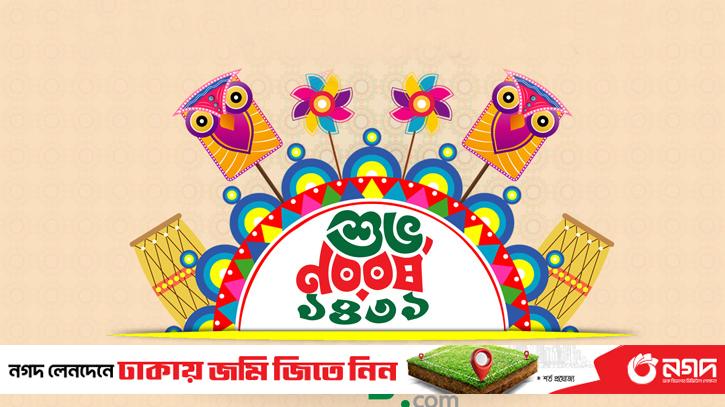Let all the worn-out and old be swept away, 'Mushe jaak Glani' – this is how the Bengalis call to the departing sun. Today is Pahela Boishakh, the first day of Bengali New Year.
Pahela Baisakh inspires us to avoid all narrowness and hypocrisy and build a liberal lifestyle. Removes all the pains and weariness in our mind; It inspires us to live with renewed vigor. We are Bengalis, a proud nation in the heart of the world, this sense of patriotism and Bengaliness in us is revived and energized on the occasion of Pahela Boishakh.
Pahela Boishakh is a universal folk festival of Bengali. On this day, the new year is welcomed in a joyful atmosphere. New Year is a symbol of prosperity and new life. Forgetting the sadness of past mistakes and failures, this New Year is celebrated with new wishes for happiness, peace and prosperity.
Like every year, this year too, the country celebrates the Bengali New Year with a colorful festival. The Prothom-alo of dawn will paint new dreams, hopes and possibilities. There will be many New Year celebrations across the country including the capital.
To celebrate 'Bangla New Year 1431' in a grand manner, the government has taken a comprehensive program at the national level. The day is a public holiday. Fine Arts Faculty of Dhaka University will organize 'Mangal Shobhayatra' and cultural programs. Chhaynat will organize a cultural program at Ramana Botmule early in the morning.
Apart from this, various cultural organizations will celebrate Bengali New Year with due dignity. The Bengali New Year ceremony will necessarily begin with the performance of the National Anthem and 'Eso Hey Boishakh Song'. Various programs will be organized on this day under the initiative of the Ministry of Culture and Bangla Academy highlighting the significance of Bengali New Year and the history of Mars procession and its inclusion as a world cultural heritage by UNESCO. Bangladesh Shilpakala Academy will organize day-long program. Traditional Bengali food of high quality will be organized in all prisons, hospitals and children's families (orphanages) on Bengali New Year.
Once New Year was celebrated as Artava Utsav or seasonal festival. It was then closely related to agriculture, as agriculture was seasonal. Later, Bengali year calculation was started during Mughal Emperor Akbar's time to facilitate agriculture and tax collection. This new Bengali year was introduced based on Hijri Chandrasana and Bengali solar year. In the past, the main festival of Bengali New Year was Halkhata. It is purely an economic matter. Businessmen in villages and cities used to close their old accounts and open new accounts at the beginning of the new year. On this occasion, they would invite new and old customers and distribute sweets and establish new business links with them. This traditional ceremony is celebrated even today.
Bengali San, which came into effect in 1556, was initially known as Fosli San. Later it came to be known as Bangabda. Although the history of Bengal is connected with the agricultural rural society, the political history is also connected with it. During Pakistan's rule, the anniversary ceremony was closely associated with Bengali nationalism. And at the end of the sixties, it got a special dimension through the organization of Chayanot in Ramana Botmule. At that time, Varsovaran started in a limited form at the civic level in Dhaka. After our great independence, gradually this festival began to influence the civic life.
The non-communal and democratic spirit of Bengalis began to emerge during the New Year celebrations of Pahela Boishakh. Over time, Varshavaran ceremony is now not just a festival of joy, but it has become a strong bearer of Bengali culture. Not only that, along with the festival, protests against tyranny and tyranny have also come in the organization of Pahela Baisakh. In 1989, the first Mangal Shobhayatra was organized by the Fine Arts Institute of Dhaka University. On November 30, 2016, UNESCO gave the procession the status of World Cultural Heritage.
Roads which will be closed on Ramna Botmul and Dhabi Kendrik on Pahela Baisakh
On the occasion of Pahela Baisakh celebrations, road closure/road diversion will be provided in some areas in Ramna Botmul and Dhaka University (DU) areas from 5 am to 4 pm.
The diversion points provided by Dhaka Metropolitan Police (DMP) Traffic Division are- Banglamotor Crossing, Minto Road Crossing, Officers Club Crossing, Kakrail Church Crossing, Kadam Foara Crossing, UBL Crossing, Doel Chatwar Crossing, Dhaka University Medical Center Crossing, Jagannath Hall Crossing, Vaskarya Crossing, Neelkhet Crossing and Kantaban Crossing.
Alternative roads for vehicular movement
Passenger vehicles from Mirpur-Farmgate towards Shahbagh will reach their destination via Banglamotor-Mogbazar, Passenger vehicles towards Bangbazar-High Court towards Matsya Bhavan will reach their destination via Kadam Foara-UBL Crossing, Passenger vehicles towards Matsya Bhavan from Zero Point-Kadam Foara will reach their destination via UBL-Nightingale Crossing. On arrival, passenger vehicles from Shantinagar-Rajmoni towards Gulistan and Sadarghat will reach their destination via Nightingale-UBL crossing.
Residents of the city have been requested by DMP to avoid the above areas/roads and use alternative roads during the said period.
